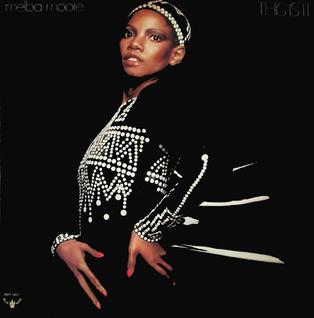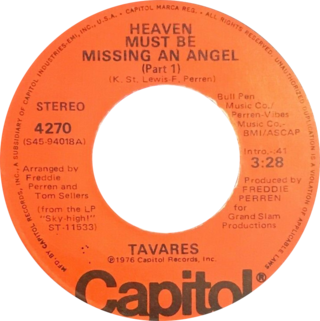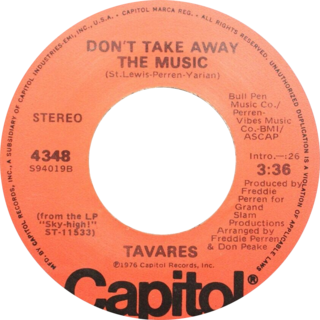Related Research Articles

"I'm Every Woman" is a song by American singer Chaka Khan, released in September 1978 by Warner Bros. as her debut solo single from her first album, Chaka (1978). It was Khan's first hit outside her recordings with the funk band Rufus. "I'm Every Woman" was produced by Arif Mardin and written by the successful songwriting team Nickolas Ashford and Valerie Simpson. The single established Chaka's career outside the group Rufus, whom she would leave after their eighth studio album, Masterjam, was released in late 1979.

"Love Rollercoaster", sometimes rendered as "Love Roller Coaster", is a song by American funk/R&B band Ohio Players, originally featured on their 1975 album Honey. It was composed by William Beck, Leroy Bonner, Marshall Jones, Ralph Middlebrooks, Marvin Pierce, Clarence Satchell, and James Williams. It was a number-one U.S. hit in January 1976, and was certified gold. In Canada, the song spent two weeks at number two. "Love Rollercoaster" was covered by American rock band Red Hot Chili Peppers for the soundtrack of the 1996 animated movie Beavis and Butt-Head Do America.

"You'll Never Find Another Love Like Mine" is a song written by Kenny Gamble and Leon Huff and performed by R&B singer Lou Rawls on his 1976 album All Things in Time. The song proved to be Rawls' breakthrough hit, reaching number 1 on both the R&B in September 1976 and Easy Listening charts as well as number 4 on the dance chart and number 2 on the US Billboard Hot 100. This was the first and only time that one of Rawls' records reached Billboard's pop Top Ten.

"More, More, More" is a song written by Gregg Diamond and recorded by American artist Andrea True. It was released in February 1976 as the first single from her debut album by same name (1976), becoming her signature track and one of the most popular songs of the disco era. In the US, it reached number four on the Billboard Hot 100 and spent three weeks at number three on the Cash Box Top 100 in July of that year. In Canada it was a number one hit, and reached number five in the UK.

"Get Down Tonight" is a song released in 1975 on the self-titled album by the disco group KC and the Sunshine Band. The song became widely successful, becoming the first of their five No. 1 hits on the Billboard Hot 100. It also reached the top of the Hot Soul Singles chart and was an international chart hit, reaching No. 1 in Canada and charting in Australia, Belgium, the Netherlands, and the UK.

"This Is It" is a 1976 disco song written by Van McCoy, and performed by American singer and actress Melba Moore for her fifth album of the same name (1976).

"Disco Lady" is a 1976 single by American singer Johnnie Taylor that went on to become his biggest hit. It spent all four weeks of April 1976 at No. 1 on the Billboard Hot 100 and six weeks atop the Billboard R&B chart in the U.S. It was also the first single to be certified platinum by the RIAA; ultimately it sold over 2.5 million copies. Billboard ranked it as the No. 3 song for 1976; Cash Box had it the year's No. 1 song

"Pick Up the Pieces" is a song by the Average White Band from their second album, AWB. On the single, songwriting credit was given to founding member and saxophonist Roger Ball and guitarist Hamish Stuart individually and the entire band collectively. It is essentially an instrumental, apart from the song's title being shouted at several points in the song.
"Don't Leave Me This Way" is a song written by Kenneth Gamble, Leon Huff and Cary Gilbert. It was originally released in 1975 by Harold Melvin & the Blue Notes featuring Teddy Pendergrass, an act signed to Gamble & Huff's Philadelphia International label. "Don't Leave Me This Way" was subsequently covered by American singer Thelma Houston in 1976 and British duo the Communards in 1986, with both versions achieving commercial success.

"Rock Your Baby" is the debut single by American singer George McCrae. Written and produced by Harry Wayne Casey and Richard Finch of KC and the Sunshine Band, "Rock Your Baby" became an early landmark recording of disco. It was the only international hit for McCrae. The song spent two weeks at number one on the Billboard Hot 100 in July 1974, and three weeks at number one on the UK Singles Chart that same month. The song also topped the Billboard R&B chart. The single has sold over 11 million copies, making it one of fewer than forty singles to have sold 10 million physical copies worldwide.

"Fly, Robin, Fly" is a song by the German disco group Silver Convention from their debut studio album Save Me (1975). Sylvester Levay and Stephan Prager wrote the song, and the latter produced it. "Fly, Robin, Fly" was released as the third single from Save Me in September 1975, reaching number one on the United States Billboard Hot 100. Thanks to the success of "Fly, Robin, Fly", Silver Convention became the second German act to have a number one song on the American music charts. The song received a Grammy Award for Best R&B Instrumental Performance in 1976.

"Take Your Time (Do It Right)" is the debut single by American R&B group the S.O.S. Band. It was released as the lead single from their debut studio album, S.O.S. (1980) on March 18, 1980 through Tabu Records, three months before the album's release.

"Another Star" is a song written and performed by Stevie Wonder from his 1976 album Songs in the Key of Life. It is the final track on side four of the double LP. The flute player Bobbi Humphrey appears in the last section of the song.

"I'll Be Good to You" is a 1976 hit song by R&B duo the Brothers Johnson. George Johnson, one of the two Johnson brothers in the band, wrote the song after deciding to commit to a relationship with one woman, instead of dating several at a time. While George was recording a demo for the song, family friend Senora Sam came by and added some lyrics. Brothers Johnson producer and mentor Quincy Jones heard the song, liked it, and convinced George to sing lead on the finished track. Released from their debut album, Look Out for #1, it was a top-ten hit on the Billboard Hot Singles Charts, peaking at number three, and a number one song on the Billboard R&B Charts during the summer of 1976. The single was later certified gold by the RIAA.

"Boogie Fever" is a song recorded by Los Angeles, California-based R&B group the Sylvers, from their 1975 album Showcase. Their most lucrative single, it reached No. 1 in the US on both the Billboard Hot 100 and Hot Soul Singles charts as well as reaching No. 1 in Canada on the RPM national singles chart in 1976. It was their third of nine Top 20 R&B hits and first top 40 pop single. Billboard ranked it as the No. 20 song for 1976. "Boogie Fever" is one of two gold records by the Sylvers, the other being "Hot Line".

"Cupid" is a song by the American singer Sam Cooke, released on May 16, 1961. It charted at number 17 on the Billboard Hot 100 and number 20 on the Hot R&B Sides chart; the track performed best in the United Kingdom, peaking at number seven on the UK Singles Chart. The song is featured on Cooke's greatest hits album, The Best of Sam Cooke (1962). Cooke's producers had asked him to write a song for a girl they had seen on a Perry Como TV show—but once they heard her sing, they kept "Cupid" for Cooke himself.

"Heaven Must Be Missing an Angel" is a disco song written by Freddie Perren and Keni St. Lewis. It was recorded by the American band Tavares in 1976. It was released as the first single from their fourth album, Sky High! (1976), and was split into two parts: the first part was 3 minutes and 28 seconds in length, while the second part was 3 minutes and 10 seconds. "Heaven Must Be Missing an Angel" was re-released in February 1986.

"You're My Driving Wheel" is a dance/disco song by The Supremes. The song was released on September 30, 1976 as the first single from their album Mary, Scherrie & Susaye. Along with the tracks, "Let Yourself Go" and "Love I Never Knew", "You're My Driving Wheel" peaked at number five on the disco chart. On the Soul chart, the single peaked at number fifty and number eighty-five on the Hot 100.

"Don't Take Away the Music" is a hit song by R&B/disco group Tavares, released in the fall of 1976. It peaked at number 34 on the US Billboard Hot 100 singles chart and at number four in the UK. Along with the track "Heaven Must Be Missing an Angel", the song spent two weeks at number 1 on the Hot Dance Club Play chart.
References
- ↑ Echols, Alice (March 29, 2010). "I Hear a Symphony: Black Masculinity and the Disco Turn". Hot Stuff: Disco and the Remaking of American Culture. W. W. Norton & Company. p. 32. ISBN 978-0-393-06675-3.
- ↑ Whitburn, Joel (2004). Top R&B/Hip-Hop Singles: 1942-2004. Record Research. p. 438.
- ↑ "Item Display - RPM - Library and Archives Canada". Collectionscanada.gc.ca. 1976-10-13. Retrieved 2021-10-04.